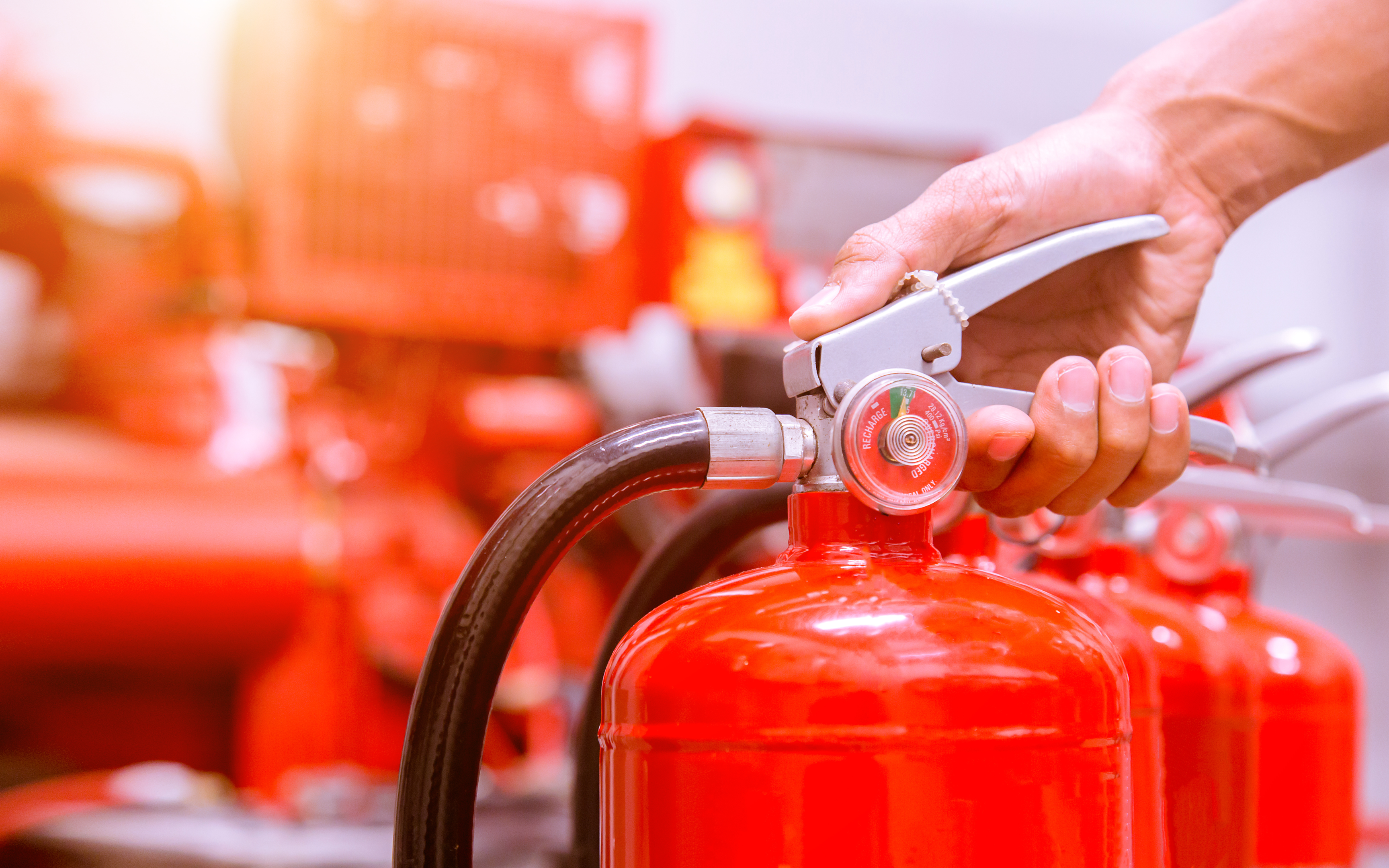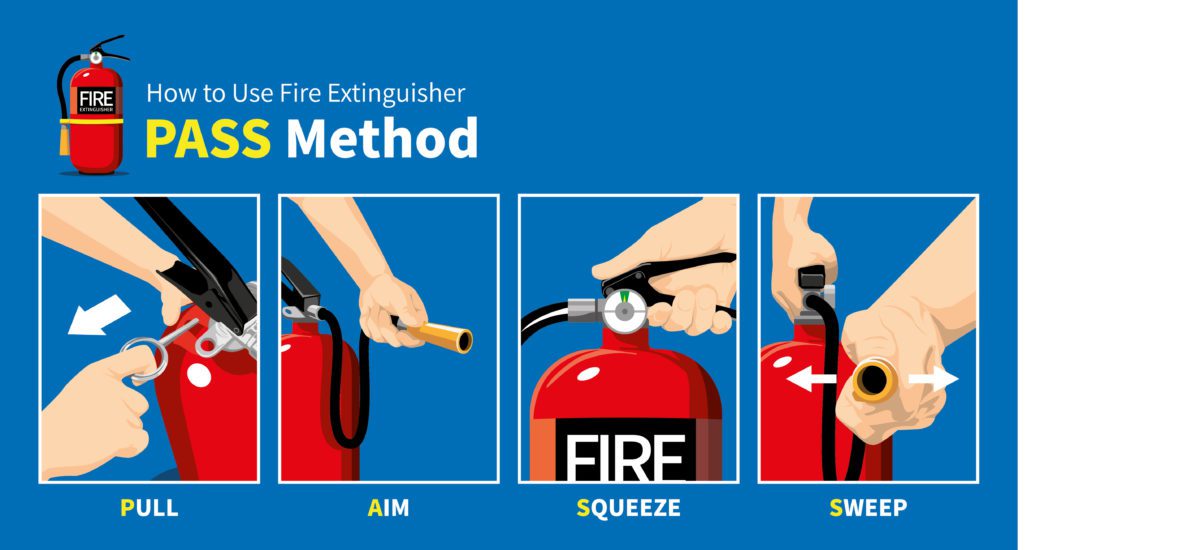When it comes to workplace and home safety, fire safety is a critical aspect that should not be taken lightly. Whether you are a landlord, facility manager, or business owner, it’s imperative to have the right type of extinguisher in place to prevent and tackle fire outbreaks.
Choosing the right fire extinguisher for your workplace or property can be daunting. With an array available in the market, it’s essential to have an understanding of what type to use for different fire causes.
In this blog, we will be discussing all things fire safety for workplaces and landlords, including which type of fire extinguisher to use for different fire causes and whether they have an expiry date.
The first step to understanding fire safety is to know what kind of fire you might encounter. Fires can be classified into different classes, depending on the fuel they consume. Each class of fire requires a specific extinguisher to put it out.
Types of fire extinguishers for each cause of fire
Class A Fires
For example, Class A fires involve ordinary combustible materials which are solid such as wood, paper and cloth. When this type of fire occurs you need to reach for foam, dry powder, wet chemical extinguishers or water fire extinguishers but avoid a carbon dioxide one.
Class B Fires – Flammable liquids
Class B fires arise from flammable liquids such as petrol, turpentine or oil based paints. This type of fire can occur from accidental causes, someone using fuel to light a bonfire or BBQ – however, it isn’t an easy one to put out. There is a reason, when flammable liquid fires happen you need an extinguishing agent capable of creating a barrier between the oxygen in the atmosphere and the fuel source. Carbon dioxide, dry-chemical and foam extinguishers can be used to put out fires started with combustible liquids.
Class C Fires – Which fire extinguisher for electrical
Class C fires involve electrical equipment. This is a common type of fire you might encounter in a commercial office setting with lots of computers, electrical outlets and assorted electrical equipment in use. For electrical fires, water and foam extinguishers must be avoided. You can use carbon dioxide or dry-chemical extinguishers for putting out flames caused by electrical fire.
Class D Fires – combustible metals
Class D fires involve flammable metals like potassium, sodium, and magnesium. However, these types of fires are not common in commercial buildings or homes. Special powder-based fire extinguishers designed for specific metals can be used to tackle Class D fires.
Class K Fires – cooking oils
Lastly, class K fires occur in kitchens due to flammable cooking oils. Wet-chemical fire extinguishers, which are typically sold alongside class B extinguishers, are the best for class K fires.
Effective fire risk assessment
The best thing to remember is that not one type of fire extinguisher will deal with all types of fire. In order to be well prepared in the event a fire occurs a thorough risk assessment is necessary.
Take for example an office environment, having a trained professional look around taking into account all manner of variables, are there many computers in confined spaces? Are there cooking appliances in staff breakout areas?
This is a very different environment to a care home for example with a kitchen area. The same trained professional would need to review whether or not the cooking appliances are in good condition or working order. Are there towels or other burning material at risk of catching alight from nearby open flames which could result in a small fire starting? What about the storage of any fats or animal oils are they in a confined space?
The key thing to determine is which cause of a fire would be most likely to occur and to have mitigation measures in place if one did start.
Do fire extinguishers have an expiry date?
Fire safety is of utmost importance in any workplace or property, which is why it is crucial to have the right fire extinguishers at hand. However, it’s essential to keep in mind that fire extinguishers, just like any other safety equipment, do have an expiration date. Once the fire extinguisher has surpassed its expiry date, it’s best to have it replaced or recharged immediately.
Regular inspections are integral to ensuring your fire extinguishers are in good working condition and have not been tampered with. They must also be easily accessible to everyone on the premises, and anyone present should be trained on how to use them effectively in an emergency.
As a rule of thumb, fire extinguishers should undergo basic servicing every 12 months. It’s advisable to have trained professionals carry out this service to ensure that it’s done safely and efficiently, keeping you and your business out of harm’s way.
After the basic service, monthly checks are necessary to ensure that the extinguisher stays in good working order. These checks are quick and straightforward, involving a simple overall inspection of the fire extinguisher’s condition, its pressure gauge, and its headcap pin and seal.
Portable fire extinguishers can have a lifespan of between 5 to 15 years, depending on the care and maintenance they receive.

Brightchecker Inspection Software
In conclusion, being prepared for a fire break-out is crucial for the safety of all inhabitants in a building, whether it be your home, office or another establishment. Brightchecker software offers an innovative solution to help you stay ahead of fire safety issues.
Conduct your regular fire extinguisher inspections and record your smoke detector test results. Brightchecker helps ensure that you are always informed of the state of your fire safety equipment.
Remember, it is important to regularly maintain and update your fire safety tools, to not only prevent fires but to ensure a swift response in case accidents do happen. Stay vigilant and use the tools at your disposal to keep yourself and your loved ones safe. Don’t wait until it’s too late, take action now to safeguard your home or workplace from the risks of fire!

